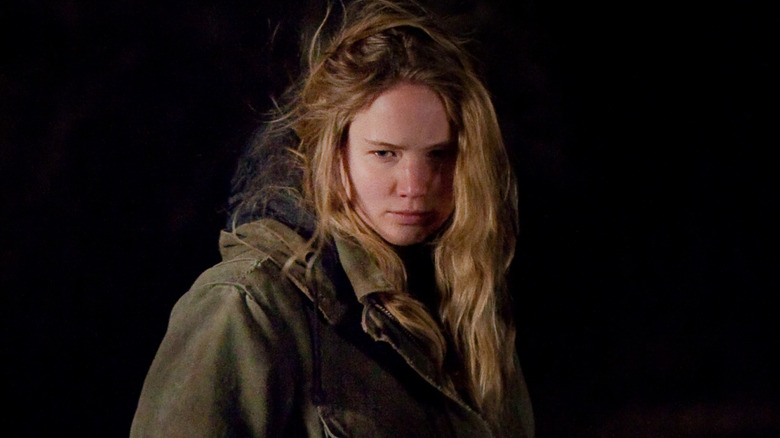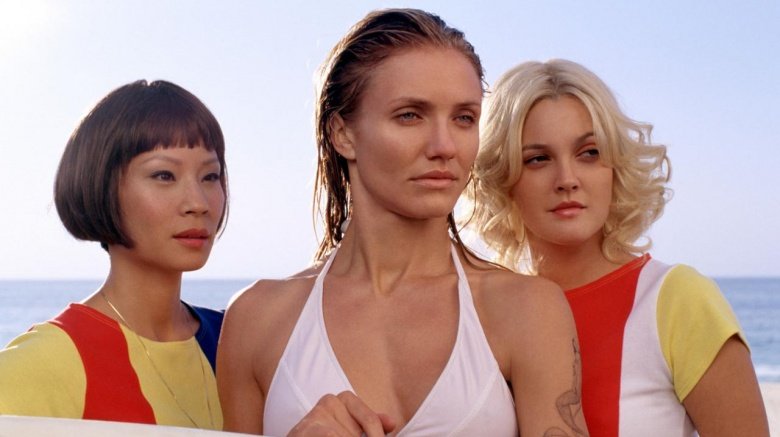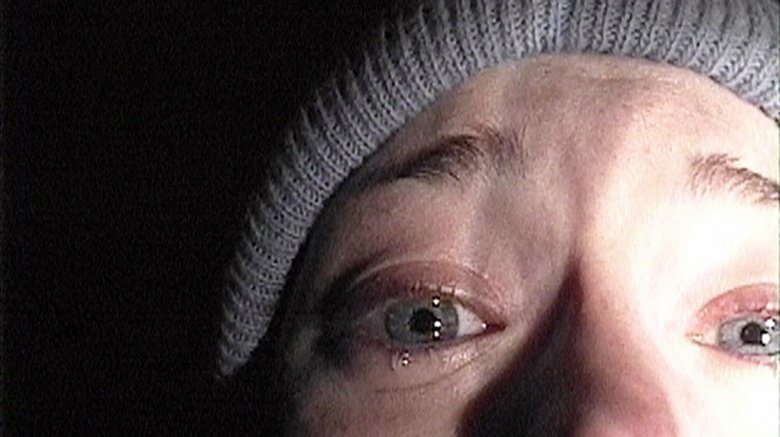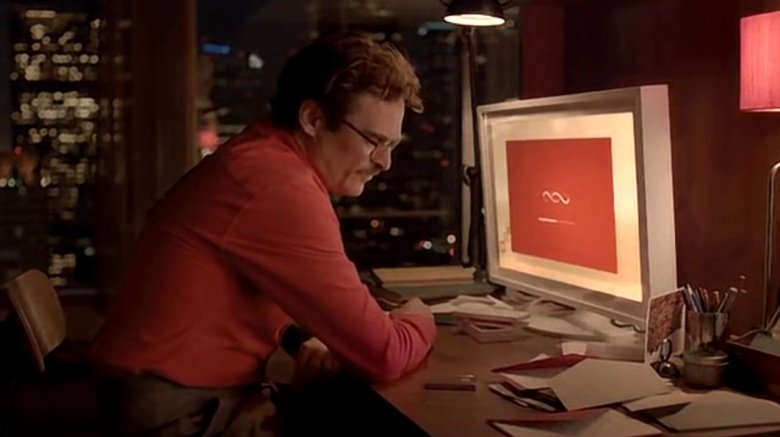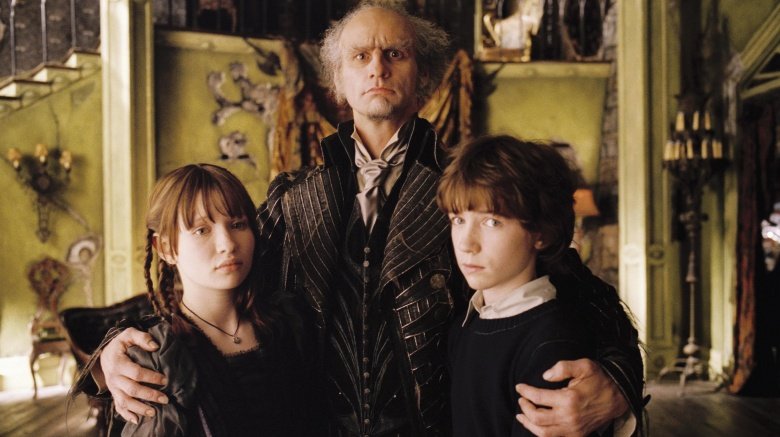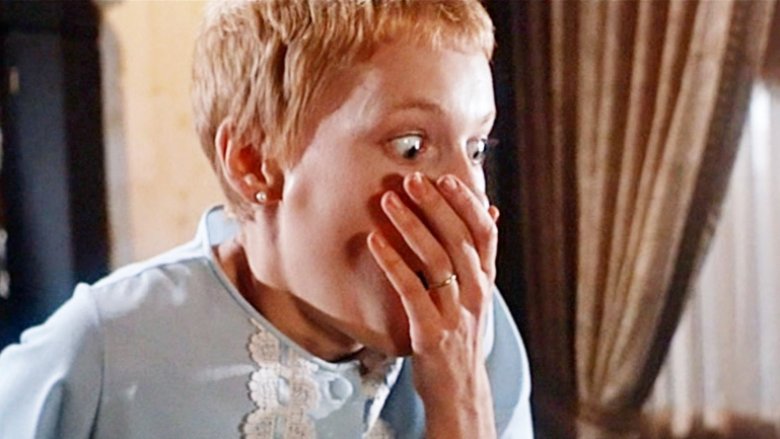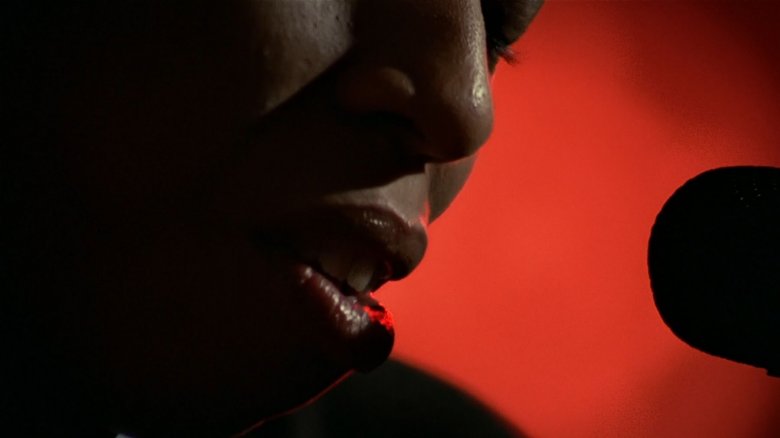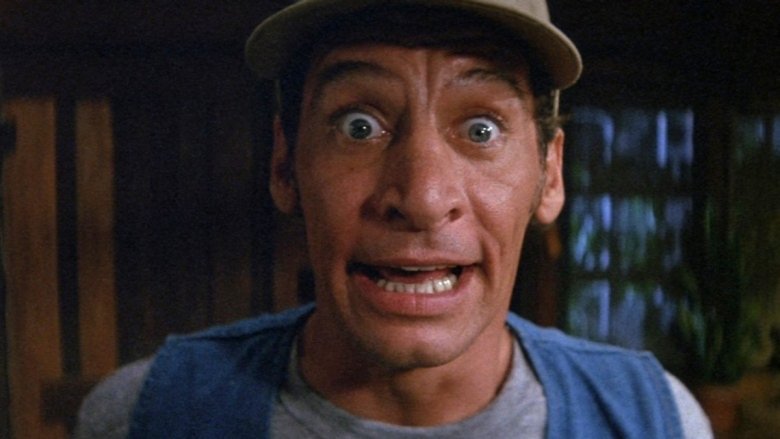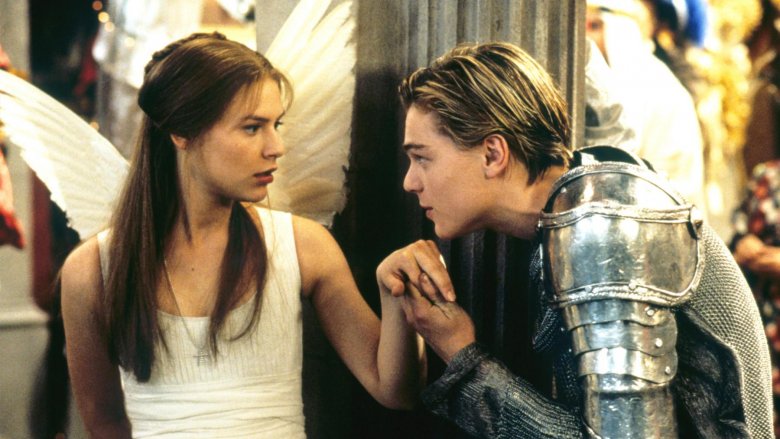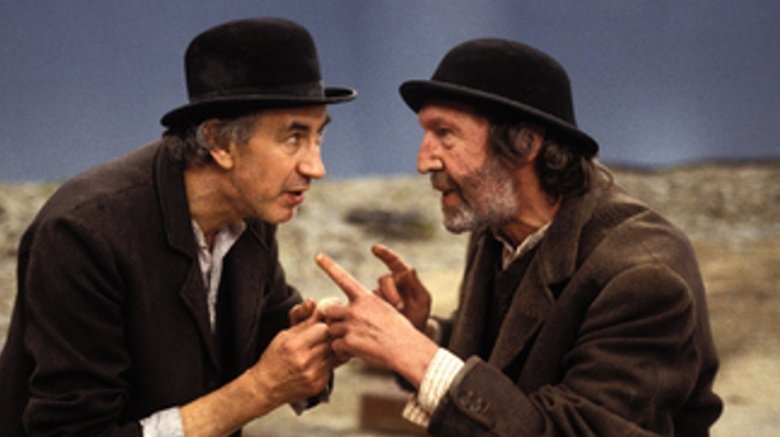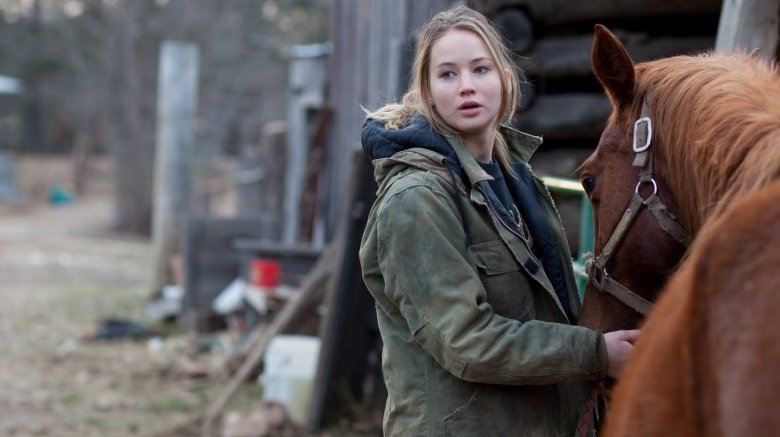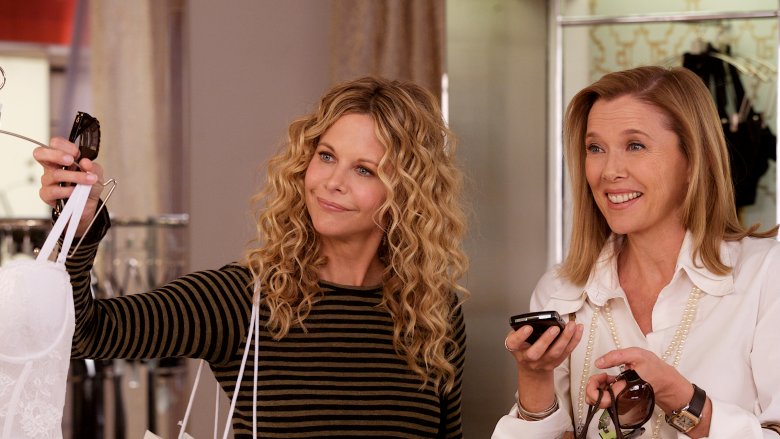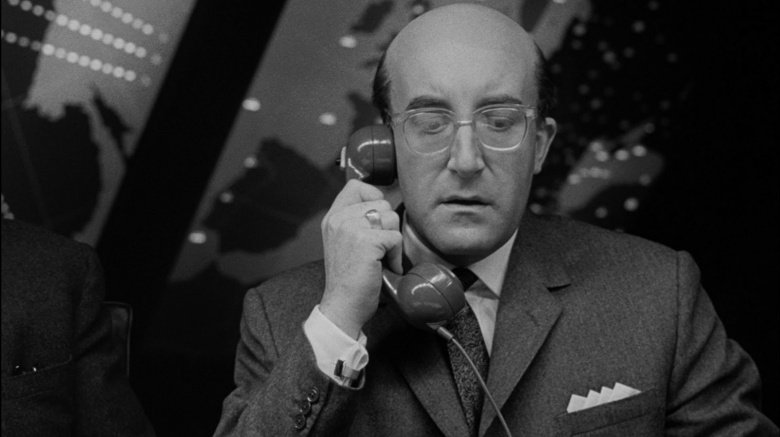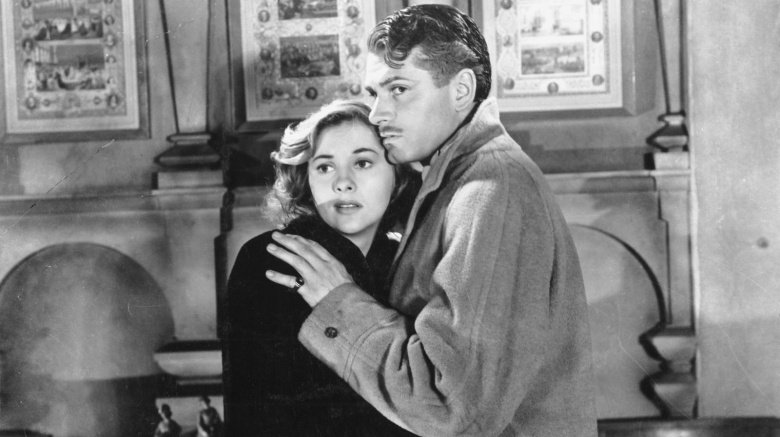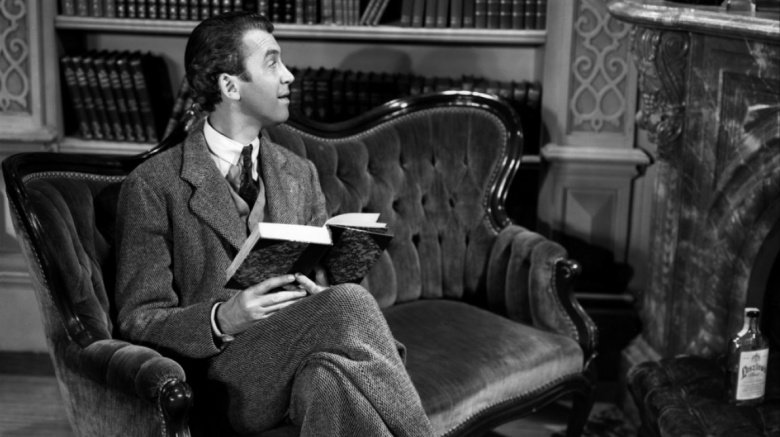Major Movie Characters You Never See
From Rocky to Annie Hall to John Wick, when a movie's title shares a name with its main character, audiences may think they have a pretty good idea of who they'll be rooting for or paying attention to once the movie begins. No matter the genre or tone of a film, viewers want to identify with and connect to a central character as they follow them through this journey, and a character whose name is dropped constantly is a pretty good candidate to center the entire story — not to mention that if a character is integral to the story, you're very likely to see them appear onscreen. So, with that in mind, what better way is there to subvert audience expectations than to keep a major character offscreen for the entirety of a film?
Television and literature are filled with great unseen characters, from Maris Crane on Frasier to the titular high-ranking army official in The French Lieutenant's Woman, but the world of film also has plenty of never-seen characters who remain integral to the plot — here's just a few of the most important characters in movies that audiences never get to see. Beware! Spoilers ahead.
Charlie in Charlie's Angels
Thanks to the success of the original Charlie's Angels television series, which ran from 1976 to 1981, a film reboot was ultimately inevitable; in 2000, director McG's adaptation, which starred Cameron Diaz, Drew Barrymore, and Lucy Liu, hit theaters. As the titular gorgeous, brilliant private detectives working out of an exclusive agency in Los Angeles, the trio lend the film the feel of the original television series while setting it in a more modern era and stretching one mystery into a longer story.
As in the original series, Charlie is perpetually unseen, accessible only through speaker and identified only as the Angels' millionaire boss who finds them different jobs, gives them instructions, and works through his assistant Bosley (Bill Murray). Though the film never addresses why Charlie isn't present, aside from indicating that he's frequently targeted by villains and assassins, the closing scene shows a man quietly observing the angels, who could possibly be Charlie himself (though he still remains obscured to the viewer).
The Blair Witch in The Blair Witch Project
One of the first forays into the modern era of the "found footage" subgenre of horror films, The Blair Witch Project was filmed over only eight days, stranding actors in the woods with handheld equipment to lend an air of authenticity to the frightening story. In fact, the viral marketing campaign was almost too successful, including the decision to keep the actors from attending the film's premiere and listing them as deceased on IMDb. The production was a real-life horror in its own right; the actors were intentionally deprived of food and pranked by the crew to elicit "real" reactions for the final product.
Within the film, the actors used their own first names — Heather, Mike, and Josh — as they made a film within a film searching for the mysterious Blair Witch, who supposedly lives deep in the woods in rural Maryland. Though they're initially skeptical of any supernatural involvement, during their time in the woods, they're tormented by some unseen force, and when Josh goes missing, it appears as if the Blair Witch herself is mimicking his screams to lure Heather and Josh. After they find an abandoned house, Mike's camera footage ends, and Heather finds him silently standing in a corner just before she's attacked herself. As the film progresses, it becomes clear why the Blair Witch is never seen: it's far scarier that way.
Samantha in Her
Spike Jonze is known for his inventive, ambitious projects, and 2013's Her, which won Best Original Screenplay at the 86th Academy Awards (as well as scoring a nomination for Best Picture), tackles the concept of artificial intelligence from an entirely new perspective. Set just slightly ahead of the present day, the film imagines a time when humans are able to create virtual assistants using artificial intelligence, and as Theodore Twombly (Joaquin Phoenix), who is going through a rough divorce and makes a living writing personal letters for others discovers, this can easily go awry.
As Theodore gets closer to his AI assistant Samantha (seductively voiced by Scarlett Johansson), he realizes that their relationship isn't as special as he previously thought, as she admits that she's in similar "relationships" and in love with hundreds of other people before telling him that she and the other AIs are leaving the human sphere. As society creeps closer to the advent of new forms of artificial intelligence, the unseen assistants of Her become even more relevant, warning audiences about the benefits and costs of technology that may soon become a reality.
Lemony Snicket in Lemony Snicket's A Series of Unfortunate Events
Adapted from Daniel Handler's 13-volume children's series of the same name (which was written under Handler's whimsical pen name, Lemony Snicket), the 2004 film Lemony Snicket's A Series of Unfortunate Events hit theaters starring big names like Jim Carrey, Meryl Streep, Joan Cusack, Catherine O'Hara, and Jude Law, among others. Tackling the first three books of the original series (albeit out of order), the film tells the story of the recently orphaned Baudelaire children — Violet, Klaus, and Sunny — who fall under the care of the evil Count Olaf (Carrey), a self-proclaimed actor who simply wants to secure the enormous Baudelaire fortune for himself. Through, well, a series of extremely unfortunate events, the three children evade Olaf thanks to their own ingenuity, keeping their fortune out of his hands.
As the writer and narrator of the series, Snicket (Law) plays a role in the film, which uses a framework that shows him penning the story of the Baudelaires, but despite his integral main part (as well the involvement of Jude Law, a well-known actor), Lemony Snicket remains shrouded in literal darkness. This fits in well with Handler's approach in the books, in which Snicket narrates but does not appear; however, Netflix's adaptation of the series took a different approach, featuring Patrick Warburton (Seinfeld) front and center as Snicket.
The Baby in Rosemary's Baby
Adapted from Ira Levin's novel, Roman Polanski's horror classic Rosemary's Baby stars Mia Farrow as Rosemary, who believes a Satanic cult wants to use her baby for evil purposes. When Rosemary and her husband Guy (John Cassavetes) move into their new apartment in New York City, they befriend their odd elderly neighbors, the Castavets (Ruth Gordon and Sidney Blackmer), who welcome the young couple with open arms. However, throughout the film, Rosemary becomes suspicious of them, and as she experiences a truly horrific pregnancy, she realizes that her child is not her husband's, but actually the son of the Devil, and she must raise the child as her own to appease this dangerous cult.
During the film's finale, Rosemary discovers that her child is the son of Satan, who "chose" her to carry his baby, and rather than show the baby directly, there's simply a flash of a demonic face, eliciting a terrified scream. In refusing to show a full shot of the child, the film leaves its appearance up to the imagination, making it a more frightening prospect than if they showed a (likely prosthetic) "demon" baby.
DJ in The Warriors
1979's The Warriors, based on Sol Yurick's 1965 novel of the same name, tells the story of a violent New York City gang forced to travel across the boroughs of New York after they're accused of the murder of a rival gang leader. Though the leader of the Gramercy Riffs, Cyrus, was really murdered by the leader of another gang, the Rogues, the Riffs immediately put out a hit on the Warriors, who must make their way to Coney Island and escape the Riffs. With a relatively unknown cast and a small budget, The Warriors stirred up controversy due to a string of gang violence after its debut in theaters, but has since gained a cult following.
Once the hit is put out on the Warriors, it's announced by a mysterious radio DJ, who remains largely invisible apart from her distinctive red lips but drives the majority of the action by narrating the hunt. Played by Lynne Thigpen (most famous for playing "The Chief" in the Carmen Sandiego franchise), DJ drove the action throughout the film, letting the Warriors know where they stood.
Vern in Ernest Saves Christmas
The second film in the long-running Ernest film series, Ernest Saves Christmas features Jim Varney's character Ernest and serves as the holiday-themed installment in the franchise. Ernest, who appeared in several commercials for brands like Coca-Cola and Chex, made his mark by always delivering an impassioned, off-topic monologue to his friend Vern while speaking directly to the camera, which always culminated in him proclaiming the virtues of whatever product he happened pitching.
In Ernest Saves Christmas, Ernest, a taxi driver working in Florida, inadvertently picks up Santa Claus and accidentally gains possession of Santa's magic sack of toys. Throughout a series of misadventures, he helps find the next man who will become Santa Claus and makes sure Christmas goes smoothly — and also throughout the film, he delivers his trademark monologues to Vern, whose POV is once again provided by the camera. During one notable scene, he helps host a Christmas party at Vern's house, much to Vern's apparent chagrin.
Rosaline in Romeo Juliet
It's almost impossible not to know the basic story of Romeo and Juliet. As the children of warring clans within Verona, Romeo and Juliet, respective heirs to the Montague and Capulet families, meet by chance at a party and immediately fall in love, even though they're programmed to hate each other (not to mention that Juliet is already engaged to someone else), and though they do their best to make a new life together, their plans are foiled at every turn. The play has seen plenty of adaptations over the years, but the most popular among modern viewers is Baz Luhrman's fantastical Romeo + Juliet, which modernizes the sets and costumes while retaining the original prose and stars a young Leonardo DiCaprio and Claire Danes, among others.
Though most know the narrative outline, it's easy to forget that Juliet isn't always the only girl on Romeo's mind — in fact, when the story begins, Romeo is heartsick over another girl, Rosaline, who seemingly won't give him the time of day. When his friend Mercutio encourages him to attend Juliet's party so he can forget about Rosaline, Romeo's former love is forgotten and, in fact, never appears in the play (or film) at all — but without her leaving Romeo heartbroken, he may never have even met Juliet.
Godot in Waiting for Godot
Samuel Beckett's Waiting for Godot is widely regarded as the most important play that was written and produced in English during the 20th century. Thanks to its notoriety, most people are aware that Godot never makes an appearance, leaving the two main characters, Vladimir and Estragon, waiting and arguing about whether they should stay or go. Throughout their wait, they interact with Lucky, a silent servant with a rope around his neck, and his cruel, loud master Pozzo, as well as an unnamed Boy who, at one point, claims to work for "Mr. Godot." Despite Vladimir and Estragon's constant debates about whether they want to continue their vigil, they never identify why they're waiting for the mysterious Godot in the first place, or even who he is.
Beckett didn't think his play should be made into a film, even turning down an offer from Ingmar Bergman, but there have been several televised performances rather than just one film adaptation, including a popular and well-received version that was a part of Beckett on Film. Throughout various Broadway adaptations, including a famous production starring Sir Ian McKellen and Sir Patrick Stewart in the lead roles, the story has lived on, and may one day see a definitive film adaptation of its own.
Ree's father in Winter's Bone
Winter's Bone, released in 2010, defied the odds by scoring multiple Academy Award nominations (including Best Picture) as well as introducing Jennifer Lawrence to mainstream film audiences. Set in the Ozarks, this low-budget drama stars Lawrence as Ree, who is solely responsible for taking care of her mentally ill mother as well as her two younger siblings. While she attempts to teach her siblings how to survive, she's also tasked with finding her father, who has disappeared after his arrest for making meth, and the stakes are high — if she doesn't find him in time, then her family's house and land will be seized, leaving them with a week to find somewhere else to live. Along the way, she runs afoul of the town's crime boss, Milton, while everyone repeatedly tells her that her father is already dead, and she tries to figure out what the real story is even as bondsmen hunt him down.
As it turns out, everyone is right — her father is, in fact, dead, as Ree discovers when the Milton clan shows her his body partially submerged in a lake. Left with only his hands to identify him to the sheriff and bondsmen, Ree's journey is over and she can be at peace, but her unseen father's character remains vital to the story, as searching for him to save her family is what drives her throughout the entire narrative.
The men in The Women
A remake of the 1939 film of the same name (which, in turn, was an adaptation of a 1936 stage play), 2008's The Women starred huge names like Annette Bening, Meg Ryan, Bette Midler, Debra Messing, Candice Bergen, and the late Carrie Fisher. Focusing on four friends in varying stages of life, the film tells the story of Mary (Ryan), a successful clothing designer, whose husband is having an affair with a perfume salesgirl at Saks. Though her friends rally around her, her closest friend Sylvie (Bening), who discovered the affair in the first place, ends up betraying Mary too. Eventually, Mary repairs her marriage, the friends come together, and Sylvie even publishes a magazine about their shared bond.
Even though a significant portion of the film focuses on Mary's marital struggles, the film features no men, not even as extras, making it a unique, female-driven affair. By keeping the focus on the women entirely, the message and story remain clear, and it sends a powerful message that a movie doesn't need men to succeed — nor do these women.
Dmitri Kissoff in Dr. Strangelove: or How I Learned to Stop Worrying and Love the Bomb
The 1964 classic Dr. Strangelove or: How I Learned to Stop Worrying and Love the Bomb was a dark comedy from the mind of legendary director Stanley Kubrick about a Cold War era nuclear conflict between the United States and the Soviet Union. Starring legends Peter Sellers and George C. Scott, the film's central conflict hinges upon a deranged general who orders a nuclear strike by the United States against the Soviet Union, and the efforts of the United States President and his cabinet to they try to stop the strike. Though this might not sound like a laugh riot, the script and Sellers' lead performance are so hilarious that the film has become known as one of cinema's best comedies, earning itself a place in the National Film Registry and the third spot on the 100 Years... 100 Laughs list at AFI.
Because the film centers on a conflict between the U.S. and Soviet Union, one might think the Russian premier would be fairly central, but thanks to the focus on the United States government's response, Premier Dmitri Kissoff is ultimately never seen, providing most of the film's push and pull without ever having to physically appear onscreen and existing only through phone calls to and from the President.
Rebecca in Rebecca
Daphne du Maurier's classic horror novel Rebecca served as the source material for the 1938 film adaptation directed by Alfred Hitchcock, which ended up winning the Academy Award for Best Picture. The film's protagonist never is given a proper name, referred to only as "the second Mrs. de Winter" (who is played by a young Joan Fontaine) after her whirlwind romance and subsequent marriage to enigmatic and mysterious millionaire Maxim de Winter (Laurence Olivier). When the couple relocates to Maxim's massive seaside estate, Manderley, the staff is welcoming and accommodating to the second Mrs. de Winter, but they constantly compare her to Maxim's first wife Rebecca, who has since passed away — especially the sinister housekeeper, Mrs. Danvers, who clearly still harbors an obsession with the cosmopolitan and elegant Rebecca.
Rebecca's absence is what drives the entirety of both the film and novel, which both hinge on revealing the disturbing circumstances of Rebecca's death, which are more sinister than a reader or viewer could anticipate. Though Rebecca seemed like the perfect wife, she was actually an abusive monster, and the entire plot thrives thanks to her absence. Without Rebecca's death, there would be no story, and neither the film nor the novel would still be popular today.
Harvey in Harvey
Based on the 1944 Pulitzer-winning stage play of the same name by Mary Chase, the 1950 film Harvey stars James Stewart and Josephine Hull and tells a rather unconventional tale. Stewart plays Elwood P. Dowd, a cheerful, friendly man with one very unique characteristic: his best friend is a giant rabbit named Harvey, who is over six feet tall and completely invisible. Though Elwood's family, including his sister Veta (Hull) and niece Myrtle Mae (Victoria Horne), are exasperated and concerned by Elwood's imaginary friend, his appealingly pleasant demeanor leads to Elwood making friends at his neighborhood bar, where the bartender always greets Harvey and serves Elwood two martinis.
Naturally, the absence of the film's title character is what drives the entire story, as Elwood's family, fearing for his well-being and sanity, has him committed to an institution to help potentially "cure" him. However, over time, Elwood's doctor, Dr. Chumley (Cecil Kellaway) begins to believe Elwood and believe in Harvey, and in the end, Elwood's loved ones save him from a medicine that would make him "normal" and stop him from seeing Harvey. The film was well-reviewed, leaving a lasting lesson that imagination is not a flaw, but something that brings real joy to anyone — and in fact, a remake is in the works today.
